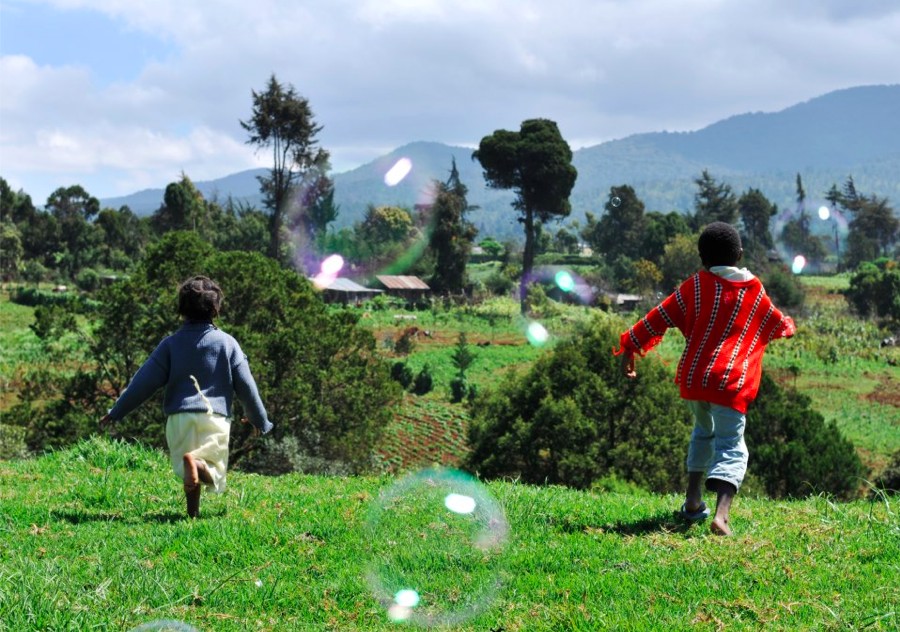
Recently, Mark*, a close friend and generous donor, approached me with an exciting prospect: His friend works for a company that makes solar panels and he was (almost) certain we could get some donated to our children's home and school in Kenya. We currently spend a small fortune on diesel for our generator, which we can only afford to run for a few hours after dark. The prospect of installing a sustainable source of electricity had us both elated. Mark's two young daughters joined us in the kitchen, a parade of blonde ponytails and backpacks. Shouting to be heard above the clamor, Mark wanted to reassure me that nothing had to change: "It's probably best to not even tell the kids in Kenya! Just continue to use electricity only when it's really needed, at night." I must have looked confused. "So they don't lose touch with their roots," he explained, leaning across me to preheat the oven in preparation for tonight's dinner of Annie's organic chicken nuggets.
I have heard this concern, in its various forms, from the minds and mouths of many donors, supporters and volunteers. Upon learning of our organization's efforts to provide some of Kenya's poorest children with access to world-class services, an overwhelming number of people are genuinely apprehensive. Although I recognize how outside influences threaten and change cultures, my mentors in Kenya have left me equally as wary of patterns of paternalism. But I wanted to learn from Mark, too, a kind and successful man raising strong daughters. "Is not having access to electricity really something we want to... preserve?" I asked. He responded thoughtfully, describing his concerns that raising children at the "orphanage" with such modern amenities would render them unable to relate to people in their own community, the vast majority of whom live on less than two dollars a day, an income largely spent on firewood and kerosene.

I do not want that, either. The very basis of our model is to give these vulnerable children the skills they need to build exceptional lives, families and communities. I have always assumed that these tools would include access to an exemplary education, to technology and the things we all need to compete on a global stage. I confided in my Kenyan colleague Mary*, a foster mother helping to raise 26 orphaned children. Despite having never left the small rural village of Njabini, Mary knows more about the world than most. I was cautious not to present Mark's concerns as my own, barely finishing my sentence before she cut in, "Ah, he wants to keep us in the dark?" Her smiled turned into a frown:
"The problem is that many people confuse being African with being poor. My mother spent her entire life washing people's clothes by hand, bent in half over a metal bucket, from morning until night. That didn't make her Kenyan. That made her poor. What made her Kenyan were the stories she told, the children she raised and the country she loved. And so about this electricity? I will raise these children to be good Kenyans, and you? You get them power, same as you have."
Her use of the word "power" in place of electricity resonated with me. In our world of technological incoherence, it's easy to feel nostalgic for days gone by. Visitors from abroad often describe being in awe of how upbeat the locals here are. "They have so little and yet they are so happy." But the truth is that life in this farming village is indescribably hard for the majority of its residents. While Kenyans are undoubtedly jubilant in their greetings, I have come to know a community that struggles deeply with poverty, oppression, depression, and hopelessness. Don't be fooled by gracious manners or a beautiful landscape: Nothing about this way of life is simple. Families here aren't climbing apple trees and catching fireflies in a mason jar; they are battling an outrageously high child mortality rate, devastating unemployment and preventable diseases.
It is these issues of suffering and inequality that drive us at Flying Kites to want to increase our community's access to the services that many of us take for granted. And besides, in 2013, is technology really anybody's to bestow or withhold? Should we really consider keeping poor children in 'poor-ish' settings, for fear that they may otherwise become too removed from where they came? In recent months my opinions have been defined by a new willingness to label such conditions as "unjust, poor and desperate." These are words that people in our community use to describe their own circumstances, while the rest of us fumble over terms like "less economically developed." It's not for us as outsiders to protect people from modernity or regulate their right to prosper.
While the children who live at Flying Kites may have access to so-called luxuries like electricity, they are also deeply engaged in issues of social justice, community service and advocacy. That is our work -- to infuse their desire for a better world with the resources to better it. And I still believe that working in solidarity with the poor means making space for their definition of better.
*Name changed